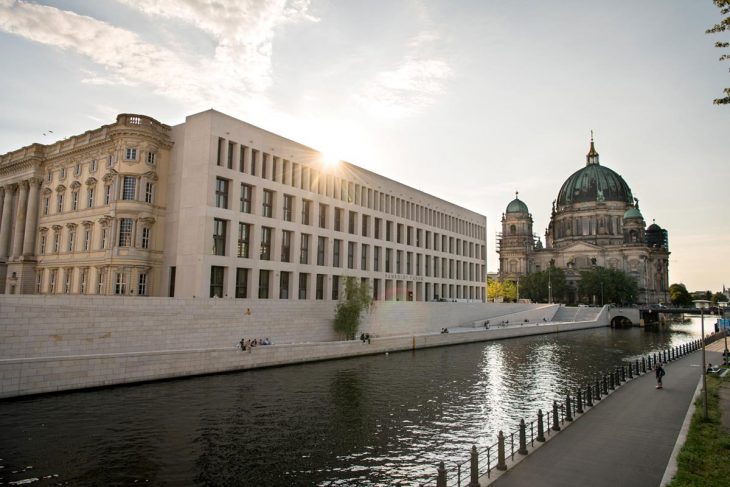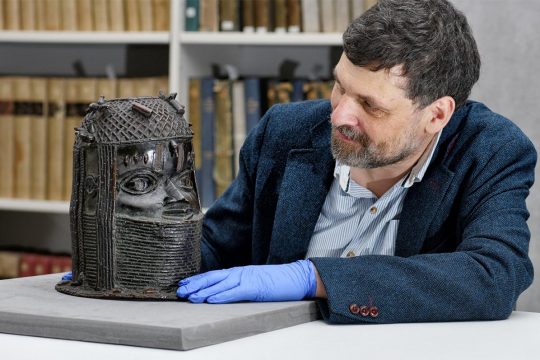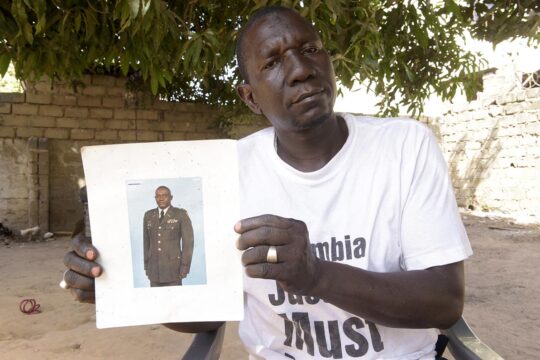Germany’s debate about the restitution of colonial artefacts culminates in a shining white castle in the heart of Berlin. The Humboldt Forum, named after the famous explorer Alexander von Humboldt – himself an avid collector of foreign flora, fauna and human remains – opened its gates in July this year after a lengthy and expensive reconstruction. It has become the capital’s most controversial museum for a variety of reasons, from the state investing 564 million Euros to reconstruct a castle from scratch, to its dome being crowned with a cross and inscription propagating the superiority of the Christian faith, to displaying an imperial orb dedicated to a late German billionaire. But the main reason why the Humboldt Forum has met so much opposition and contempt is its purpose to house one of the largest ethnological collections in the world: statues, masks, instruments, ships, jewellery and everyday objects, many of which were stolen from the former colonies of Germany or its European neighbours.
One of the highlights of the museum’s exhibition should have been the Benin Bronzes, a collection of thousands of metal plaques and sculptures taken by the British forces from the royal palace of the Kingdom of Benin in the 19th century. They were transferred to Europe where they sparked great admiration for the elaborate art of a people that was regarded as savage and uncivilized. The Bronzes were sold throughout the colonizing world and are exhibited today in France, Austria, Germany, Great Britain and the United States. Some have disappeared in private collections. 200 of the precious objects were supposed to attract visitors to the Eastwing of the Humboldt Forum starting in mid-2022. But it seems now that their assigned spot will have to be filled otherwise.
In April, the German government announced that the country would be the first in Europe to return their share of the Bronzes to its homeland in what is today Nigeria. The move was triggered by the diplomatic efforts of Yusuf Tuggar, Nigeria’s ambassador to Germany, and comes at a time when Nigeria is constructing a prestigious new national museum in Benin-City, in Southern Nigeria, where the Bronzes were originally stolen. While the Benin Bronzes in Germany are waiting to return home, historians are demanding an even deeper look into the ethnological collections, and a more extensive move toward restitution. Indeed the Benin Bronzes are merely one example of hundreds of thousands of artefacts taken by force from former colonies. Ethnological collections in Europe are filled with colonial loot, a large proportion of which is not even exhibited, but sitting idly in storage rooms across the continent.
The golden age of looting
Much shorter than that of France and Great Britain and overshadowed by the Holocaust, the German colonial past has been a neglected chapter of its history. Yet Germany not only committed the first genocide of the 20th century against the Herero and Nama population in what is today Namibia, but it also established the basis for some of its most dangerous racist ideologies on the pseudo-science conducted in its colonies at the time. And when it comes to debates about restitution, Berlin is not a bad place to start. After all, this is where European countries divided the African continent among them at the Berlin Conference in 1884 – 13 years before the British burnt down and looted the palace of Benin to consolidate their power in what they considered their territory.
The Berlin conference was followed by what Bénédicte Savoy, one of today’s most prominent historians in the field of restitutions, calls “the 34 years of ethnological museums.” Without those years, there would be no Humboldt Forum today, Savoy explains in a podcast episode on the issue. The hype of stealing, gathering, and shipping off goods from the colonies was at its peek during those years that ended with the First World War, she says. Hundreds of thousands of objects were brought to Europe by merchants, missionaries and colonial officers, where they were sold, traded and exhibited. 75.000 objects from sub-Saharan Africa remain in Germany’s collections until today – among them 1.100 Benin Bronzes, bought from London by the Royal Ethnological Museum in Berlin in the beginning of the 20th century and scattered in different museums in the country.
Germany’s step towards returning the Benin Bronzes might be one of the first, but the debate about restitution is far from new. In her book “Africa's Struggle for Its Art: History of a Postcolonial Defeat” (to be released in English in 2022) Savoy documents the African intellectuals’ and politicians’ demands for returning stolen objects starting in the 1960s, when 18 former colonies became independent. Savoy describes how the German Stiftung Preußischer Kulturbesitz (Prussian Cultural Heritage Foundation, SPK), the guardian of Germany’s ethnological collections, nipped any move toward restitution in the bud by lying about the amount and origin of its African artefacts, and by manipulating the public and political debate in its favor. One of the main arguments by the SPK head at the time was that Germany had not stolen the Bronzes, but lawfully purchased them.
Shaking off an old, hierarchical arrangement
Today, after years of public dispute, museums like the Humboldt Forum mention their colonial history dutifully at several points of their permanent and temporary exhibitions. But that does not change the fact that the objects in question are still there, Savoy insists. “It is a dishonest transparency, when they pretend – after public criticism – that they provide information on the provenance”, she said during a panel discussion titled “Decolonizing Worlds” at Berlin’s literature festival in September. Each exhibited object is now endowed with a plaque providing the facts about its origin – who collected, sold or bought it – but according to Savoy these plaques are still uncritical of the violent historical context. “Museums act neutral, but they are an expression of the nationalist and imperialist ideology of the 19th century”, she says.
Regarding the Benin Bronzes, Birgit Jöbstl, an SPK spokesperson, explained that the negotiations with their Nigerian partners were ongoing, and that “substantial returns are scheduled for 2022.” However, it seems as though the plans to exhibit the Bronzes in the Humboldt Forum still stand. “Their presentation will deal with the history of the Kingdom of Benin, its conquest by the English troops as well as the provenance of the objects from Benin”, wrote Jöbstl in an e-mail to Justice Info, adding that around half of the 400 Benin Bronzes in Berlin were to be shown there. “These plans will be reviewed during the talks with the Nigerian representatives.”
It remains to be seen how fast and complete the restitution of the Bronzes will be executed and what consequences this move will have on all the other stolen objects in Germany and Europe. Meanwhile, Savoy, together with other historians and curators from Europe and Africa, demands a whole new way of thinking about museums. “Historically, we have been the subject and the whole world the object. We look at it without ever being looked back at”, she says. Curating collectively is the way to go in the future, she believes. But she cautions that cooperation between museums or permanent loans of objects cannot be an excuse to avoid restitution. “Restitutions contribute to shaking off an old, hierarchical order and to redefine the relationship, allowing for a post-racist coexistence,” she says.








